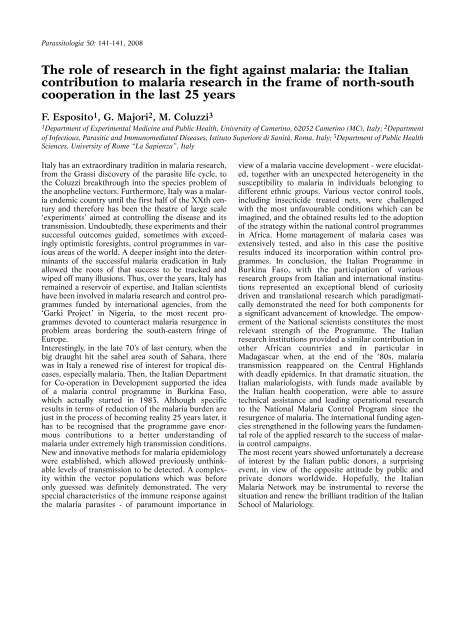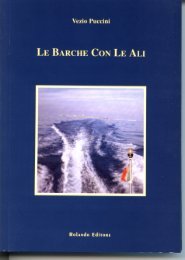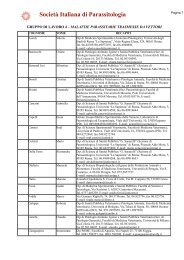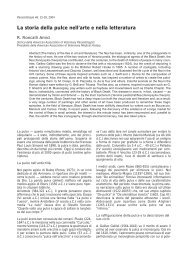impaginato piccolo - Società Italiana di Parassitologia (SoIPa)
impaginato piccolo - Società Italiana di Parassitologia (SoIPa)
impaginato piccolo - Società Italiana di Parassitologia (SoIPa)
You also want an ePaper? Increase the reach of your titles
YUMPU automatically turns print PDFs into web optimized ePapers that Google loves.
<strong>Parassitologia</strong> 50: 141-141, 2008<br />
The role of research in the fight against malaria: the Italian<br />
contribution to malaria research in the frame of north-south<br />
cooperation in the last 25 years<br />
F. Esposito 1, G. Majori 2, M. Coluzzi 3<br />
1 Department of Experimental Me<strong>di</strong>cine and Public Health, University of Camerino, 62032 Camerino (MC), Italy; 2 Department<br />
of Infectious, Parasitic and Immunome<strong>di</strong>ated Diseases, Istituto Superiore <strong>di</strong> Sanità, Roma, Italy; 3 Department of Public Health<br />
Sciences, University of Rome “La Sapienza”, Italy<br />
Italy has an extraor<strong>di</strong>nary tra<strong>di</strong>tion in malaria research,<br />
from the Grassi <strong>di</strong>scovery of the parasite life cycle, to<br />
the Coluzzi breakthrough into the species problem of<br />
the anopheline vectors. Furthermore, Italy was a malaria<br />
endemic country until the first half of the XXth century<br />
and therefore has been the theatre of large scale<br />
‘experiments’ aimed at controlling the <strong>di</strong>sease and its<br />
transmission. Undoubtedly, these experiments and their<br />
successful outcomes guided, sometimes with excee<strong>di</strong>ngly<br />
optimistic foresights, control programmes in various<br />
areas of the world. A deeper insight into the determinants<br />
of the successful malaria era<strong>di</strong>cation in Italy<br />
allowed the roots of that success to be tracked and<br />
wiped off many illusions. Thus, over the years, Italy has<br />
remained a reservoir of expertise, and Italian scientists<br />
have been involved in malaria research and control programmes<br />
funded by international agencies, from the<br />
‘Garki Project’ in Nigeria, to the most recent programmes<br />
devoted to counteract malaria resurgence in<br />
problem areas bordering the south-eastern fringe of<br />
Europe.<br />
Interestingly, in the late 70’s of last century, when the<br />
big draught hit the sahel area south of Sahara, there<br />
was in Italy a renewed rise of interest for tropical <strong>di</strong>seases,<br />
especially malaria. Then, the Italian Department<br />
for Co-operation in Development supported the idea<br />
of a malaria control programme in Burkina Faso,<br />
which actually started in 1983. Although specific<br />
results in terms of reduction of the malaria burden are<br />
just in the process of becoming reality 25 years later, it<br />
has to be recognised that the programme gave enormous<br />
contributions to a better understan<strong>di</strong>ng of<br />
malaria under extremely high transmission con<strong>di</strong>tions.<br />
New and innovative methods for malaria epidemiology<br />
were established, which allowed previously unthinkable<br />
levels of transmission to be detected. A complexity<br />
within the vector populations which was before<br />
only guessed was definitely demonstrated. The very<br />
special characteristics of the immune response against<br />
the malaria parasites - of paramount importance in<br />
view of a malaria vaccine development - were elucidated,<br />
together with an unexpected heterogeneity in the<br />
susceptibility to malaria in in<strong>di</strong>viduals belonging to<br />
<strong>di</strong>fferent ethnic groups. Various vector control tools,<br />
inclu<strong>di</strong>ng insecticide treated nets, were challenged<br />
with the most unfavourable con<strong>di</strong>tions which can be<br />
imagined, and the obtained results led to the adoption<br />
of the strategy within the national control programmes<br />
in Africa. Home management of malaria cases was<br />
extensively tested, and also in this case the positive<br />
results induced its incorporation within control programmes.<br />
In conclusion, the Italian Programme in<br />
Burkina Faso, with the participation of various<br />
research groups from Italian and international institutions<br />
represented an exceptional blend of curiosity<br />
driven and translational research which para<strong>di</strong>gmatically<br />
demonstrated the need for both components for<br />
a significant advancement of knowledge. The empowerment<br />
of the National scientists constitutes the most<br />
relevant strength of the Programme. The Italian<br />
research institutions provided a similar contribution in<br />
other African countries and in particular in<br />
Madagascar when, at the end of the ‘80s, malaria<br />
transmission reappeared on the Central Highlands<br />
with deadly epidemics. In that dramatic situation, the<br />
Italian malariologists, with funds made available by<br />
the Italian health cooperation, were able to assure<br />
technical assistance and lea<strong>di</strong>ng operational research<br />
to the National Malaria Control Program since the<br />
resurgence of malaria. The international fun<strong>di</strong>ng agencies<br />
strengthened in the following years the fundamental<br />
role of the applied research to the success of malaria<br />
control campaigns.<br />
The most recent years showed unfortunately a decrease<br />
of interest by the Italian public donors, a surprising<br />
event, in view of the opposite attitude by public and<br />
private donors worldwide. Hopefully, the Italian<br />
Malaria Network may be instrumental to reverse the<br />
situation and renew the brilliant tra<strong>di</strong>tion of the Italian<br />
School of Malariology.






